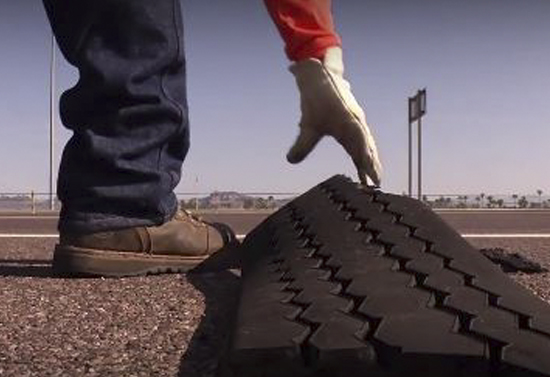Driving Safety Home: Properly maintained tires keep you, your passengers and other drivers safe
Driving Safety Home: Properly maintained tires keep you, your passengers and other drivers safe

By Dallas Hammit / ADOT State Engineer
Last month, I talked about how being prepared for summer weather can make all the difference. But besides high temperatures, monsoons and dust storms, there’s another summertime safety issue I want more drivers to be aware of...
When the temperatures heat up, motorists need to stay alert and be on the lookout for tire treads and other debris that can end up on the highways. Known sometimes as “gators,” the tire treads that wind up on the road after someone has a blowout can create a hazard for other drivers. The number of gators we all see on the road seems to increase in the hotter months.
You as a driver can actually help limit the chances of creating highway gators by properly maintaining your tires – that includes regularly checking your vehicle’s tire pressure to reduce the risk of blowouts.
According to the National Highway Traffic Safety Administration, about 700 people die every year in tire-related crashes. There’s a lot we all can do to help drive that number down.
Published on the ADOT Blog last year, here are some tips from SaferCar.gov that will help keep your vehicle’s tires in shape:
- Inflate your tires according to the pressure specified in your vehicle’s manual or tire information label on the driver’s side door edge.
- Properly inflating tires improves fuel efficiency, providing as much as 11 cents more value per gallon.
- Follow your car’s maintenance guidelines and rotate tires as specified. Also, be sure they are balanced and aligned correctly for optimal performance.
- Check the tread on your tires. Tires should be replaced when tread is worn down to 2/32 of an inch. Running out the clock on your tires can result in a blowout.
- Many newer vehicles have automated tire pressure monitoring systems. Typically, these alerts are sent when a tire is significantly deflated, making regular checks is a good idea. Keep a tire pressure gauge in your glove box.
Just remember that properly maintaining your tires can actually help to make them last longer – it’ll also save you money in the long run.
Most importantly though, the steps you take to maintain your tires will help protect you and other drivers on the road. For even more information about tire safety, visit NHTSA.gov/tires.
Editor's Note: More safety messages from Dallas Hammit, ADOT's state engineer and deputy director for transportation, are available at Driving Safety Home on azdot.gov.

